Feature: Meet the Gambian migrants under pressure to leave Europe.
The
Gambia’s leader of 22 years, Yahya Jammeh, used to give Gambians good
cause for claiming asylum, even if the majority were fleeing poverty
rather than persecution.
By Louise Hunt - Freelance journalist and regular IRIN contributor specialising in social affairs and international development, CATANIA, 20 July 2017.
But with the autocratic president’s exit in January, Gambians’ grounds for international protection have suddenly become shakier, making them prime EU targets for rapid return, although they are not the only ones.
Gambians are one of the top nationalities among the 93,000 mainly West African and Asian migrants who have arrived in Italy already this year. The majority, as in preceding years, are unlikely to qualify for asylum. And yet Italy, like most EU states, has had little success in forcibly returning them home or persuading them to leave voluntarily.
Italy’s threat to close its ports to foreign rescue vessels at the end of June prompted the EU to come up with an action plan promising more support, not only in deterring migrants from crossing the Mediterranean, but also in stepping up returns of those already on Italian soil.
Left to fester
Ebrima Gaye was 17 when he disembarked a rescue boat in Pozzallo, Sicily in July 2016. He spent seven months in a centre for minors near Syracuse. After turning 18 in March, he was shunted around several times before being sent to the Frasca Centre in Rosolini.
Like many of the 2,000 extraordinary reception centres (CAS) scattered across Italy, Frasca was once a hotel. A white behemoth of a building, it sits on top of a scrubby hillside on the outskirts of town.
Residents congregate in a large living area with a pool table, where young men sit slumped on chairs, staring at their phones while daytime television babbles in the background. Others lie on their beds in dorms that sleep up to 30, immobilised by the stultifying heat and boredom.
The centre is meant to be an “emergency” short-term facility, but the overwhelming demand on Italy’s reception system means camps like this one have become holding pens, while migrants’ asylum claims move through the glacial legal system. Some residents have been there for a year.
Under Italian law, asylum seekers who have a residence permit can seek work, but residents reported that they had been forbidden from working while living in this centre.
Gaye’s asylum application was rejected in May and he is waiting to appeal the decision. Almost a year after arriving, the reed-thin boy glumly admits he regrets making the journey.
Before leaving, Gaye worked as a barber in his home village on the banks of the River Gambia. “I am the firstborn son, so I contributed to my family, but the money I was saving was very small. Many of my friends had taken ‘the back way’ [the irregular route to Europe via the Sahel and Libya], so I decided to go,” he said.
But Gaye’s savings only got him as far as Agadez in Niger, then he had to beg his family to send him $2,400 to complete his journey.
Prisoners of hope
Gambia’s new government has received unprecedented amounts of development aid from the EU to tackle its “back way” exodus with youth training and job creation programmes. But none of the young Gambians IRIN spoke to were persuaded by the promise of what has been dubbed “New Gambia”.
“I spent a lot coming here,” Gaye said. “I could have had a good business in Gambia, but now I’ve been here a year and I have gained nothing. So it is better I stay here and try to find something for my future first.”
In a camp for minors in Messina, IRIN found another Gambian, Yahya Damfa*, much of the same opinion. “I’m not thinking about returning anyway,” said the 17-year-old. “I haven’t heard of any improvement yet (in The Gambia), I think it will take some time. I tell myself, ‘if I have made it to Europe I’d rather manage here’.”
Once migrants like Gaye and Damfa have crossed the Mediterranean, the financial and psychological costs of the often-harrowing journey make the prospect of returning home empty-handed too much to bear. They become prisoners of hope.
That hope, however futile, combined with the EU’s poor record on returns are the fundamental factors perpetuating Europe’s migration crisis, believes Gerald Knaus, chair of the European Stability Initiative, a Berlin-based think tank.
“Anybody from West Africa who makes it to Libya [and] survives the boat trip is in Europe forever, irrespective of whether they get refugee status or not. Unless this changes, the flow will continue,” he told IRIN.
Low return rates
Last year, 12,000 Gambians arrived in Italy, but just 15 were forcibly returned, according to Eurostat figures.
There is currently no readmission agreement with The Gambia. The Italian government attempted to negotiate one with Jammeh’s government in early 2016, but was unsuccessful. The Ministry of the Interior did not respond to IRIN’s request for information on whether new negotiations have started.
Knaus is hopeful that the Italian government will seriously consider ESI’s policy proposal, which is being released this week. The so-called Rome Plan is based on a premise of “return realism”, explained Knaus, who was involved in drawing up the controversial EU-Turkey Agreement.
Knaus’ new initiative urges the EU and member states to accept that poor countries that rely heavily on remittances currently have nothing to gain from taking back their citizens. According to the Rome Plan, member states should offer migrant-sending countries a certain amount of legal access in the form of scholarships or work visas in return for taking back their nationals who do not qualify for protection.
“Legal access has never before been linked to controlling irregular access,” Knaus said. “With this [plan] you have less suffering, it benefits the development of the country of origin and it’s in line with the Refugee Convention.”
For now, Italy’s response to its clogged up asylum and migrant reception system has been a series of immigration reforms introduced by interior minister Marco Minniti in April. They include the creation of 16 new repatriation centres. But without more readmission agreements with countries of origin, detaining more irregular migrants in the new centres will be pointless, believes Flavio di Giacomo, a spokesman for the International Organization for Migration (IOM) in Italy.
“By law, migrants will only be able to stay [at the repatriation centres] for 60 days,” he told IRIN. “If they cannot be repatriated, they will get an order to leave by themselves. It will only increase Italy’s irregularity problem.”
The bottom line is that most Gambian migrants, who are unlikely to qualify for international protection or be deported, face a future of trying to survive in Italy’s informal economy.
Hustling to get by
In Catania and other Sicilian cities, each migrant nationality has a speciality: Bangladeshis clean car windscreens, young Nigerian women, most trafficked from Edo State, sell themselves, and Gambians push drugs.
They loiter in alleyways in Catania’s red-light district of San Berillo, sleep in derelict squats, and wheel their worldly possessions along the streets in shopping trolleys. One Gambian teenager, holding a can of beer, staggers over to slur a greeting to staff from Oxfam’s Open Europe programme, which supports irregularised migrants in Sicily. Back in Muslim-majority Gambia, such behaviour would be taboo.
Migrants like Mouhag Nyang, a 29-year-old Gambian, are completely reliant on charities to support their needs.
Nyang, who arrived in Italy in 2014, has been living in a homeless shelter in Catania for the past two years since failing to qualify for protection. Nevertheless, he would rather stay in Italy than return home. “For me, I see Italy is better; here they give us a place to sleep. I would have nothing to go back to in Gambia. My uncle sold my family compound to travel [the backway].”
Di Giacomo believes that helping more of these migrants to return home with at least a small amount of cash could go some way towards addressing the shame issue.
“Nobody wants to return empty-handed,” he explained. “AVR [Assisted Voluntary Return] is trying to solve this through reintegration packages worth 1,600 euros, plus they are given 400 euros in cash at the airport in Italy, so that there is a possibility to start again when they return.”
The EU’s action plan urges Italy to partner with IOM to increase the use of AVR and reintegration procedures. However, only one Gambian has opted to return via the programme so far this year.
IOM is working with the Italian Ministry of the Interior to raise awareness with migrants about the opportunity to leave voluntarily with financial support, but di Giacomo is worried about a surge in demand. “We can only assist a maximum of 2,500 AVRs,” he said, adding that funding for AVR still represents only a small portion of the overall EU budget for returns.
For Gaye, such an opportunity could go some way towards addressing a difficult homecoming. “We are all praying to go back to our homeland, but to go back without achieving nothing is going to be so hard for me,” he said.
“My family would not agree to that, it would hurt them so much. Nobody wants to go back a loser.”
*name changed
lh/ks/ag
The production of this article has received funding from the Migration Media Award, funded by the EU. The information and views set out in this article are those of the author(s) and do not necessarily reflect the official opinion of the European Union. Neither the European Union institutions and bodies nor any person acting on their behalf may be held responsible for the use which may be made of the information contained therein.

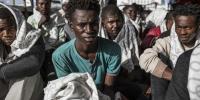

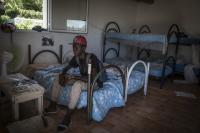
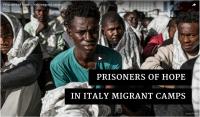
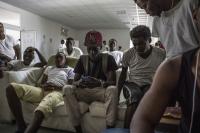
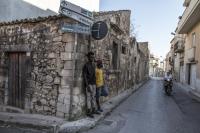
The only possibility
Let the migrants work, let them make their own life. Thousands of people risk their life for a better future, because in their "home-country" they have absolutely no perspective. And don't forget, that this situation is made by the colonisers who are still exploiting Africa and many other parts of the world. Europe is responsible! Europe has to pay for that! That's the only way: Open the borders and stop the visa regime! Let people travel, with equal rights - freedom also means freedom of movement. Only this can save the world! There is no other possibility!